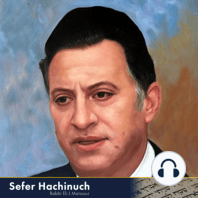20 min listen
Misva #296: Kiddush Hashem
FromSefer Hachinuch
ratings:
Length:
20 minutes
Released:
Oct 13, 2022
Format:
Podcast episode
Description
The Torah commands in Parashat Emor (Vayikra 22:32), “Ve’nikdashti Be’toch Beneh Yisrael” – “I shall be glorified in the midst of Beneh Yisrael.” This verse establishes the obligation to bring glory to G-d by being prepared to surrender one’s life for the sake of the Torah under certain circumstances. The Sefer Ha’hinuch explains that every person was created solely for the purpose of serving his Creator, and a servant who is not prepared to sacrifice his life for the sake of his master is not a truly faithful servant. Indeed, the Sefer Ha’hinuch observes, servants of human masters will do anything for their masters, even surrendering their lives. Certainly, then, as servants of the King of kings, we have an obligation to give our lives for His service when this becomes necessary. There are several different situations in which one is required to sacrifice his life for the sake of avoiding a Torah violation. If one is forced at the threat of death to commit any of the three major sins – idol worship, sexual immorality, or murder – then he must refuse, even at the expense of his life. It is forbidden to bow to an idol for the sake of saving one’s life even if one is not truly worshipping the idol, and remains fully loyal to G-d in his heart. This requirement applies at all times, and regardless of whether the sin would be committed publicly or privately. Moreover, it makes no difference whether the gentile forces the Jew to commit the act for the purpose of opposing the Jewish religion, or for some other reason. Under any circumstance, one must refuse to commit any of these three sins even at the threat of death. All other sins, as a general rule, may be violated for the sake of saving one’s life. For example, as we know, Shabbat may be desecrated in the interest of saving human life. However, there are two important exceptions to this rule. One is a case where a gentile forces a Jew to violate the Torah publicly. If the gentile wants the sin committed for his own personal benefit, then the Jew may transgress in order to save his life, but if the gentile’s intent is to have the Jew violate the Torah, then the Jew must surrender his life rather than publicly transgress. The other exception is a “She’at Ha’shmad” – a period of religious persecution, when the foreign government issued edicts to ban religious observance. During such a period, when the authorities launch a campaign to abolish Torah observance, then a Jew must refuse to violate the Torah regardless of whether the act is to be done privately or publicly, and even if this particular gentile forces the Jew to transgress for his own personal benefit. The Ran (Rabbenu Nissim of Gerona, Spain, 1320-1376) explains that in a time of persecution, even private violations become public, as the authorities will inform the other Jews that a Jew had transgressed in order to break their spirit. Therefore, in times of persecution, a Jew must avoid violating the Torah even at the threat of death under all circumstances. This applies even to a “Misva Kala” – a relative minor command. The Gemara says that in a “She’at Ha’shmad,” even if a Jew is told to wear shoes which the gentiles wear and the Jews do not, the Jew must surrender his life to avoid complying with their edict. As mentioned earlier, if a Jew is ordered at the threat of death to take his fellow’s life, he must refuse. The Gemara explains that this is due to the fact that he has no reason to assume that his blood is “redder” than his fellow’s. Nobody can ever decide that his life is worth more than his fellow’s life, and so he is not entitled to take somebody else’s life in order to spare his own life. The Sefer Ha’hinuch explains this to mean that nobody knows whether he will perform more Misvot in the future than anybody else, and so he has no right to take somebody else’s life to save his. Such calculations cannot be made by a human being. If the authorities demand that the Jews hand over to them one person whom they wo
Released:
Oct 13, 2022
Format:
Podcast episode
Titles in the series (100)
Misva #19: The Prohibition Against Eating Hametz on Pesach: Daily Sefer Hachinuch - Brought to you by itorah.com by Sefer Hachinuch
